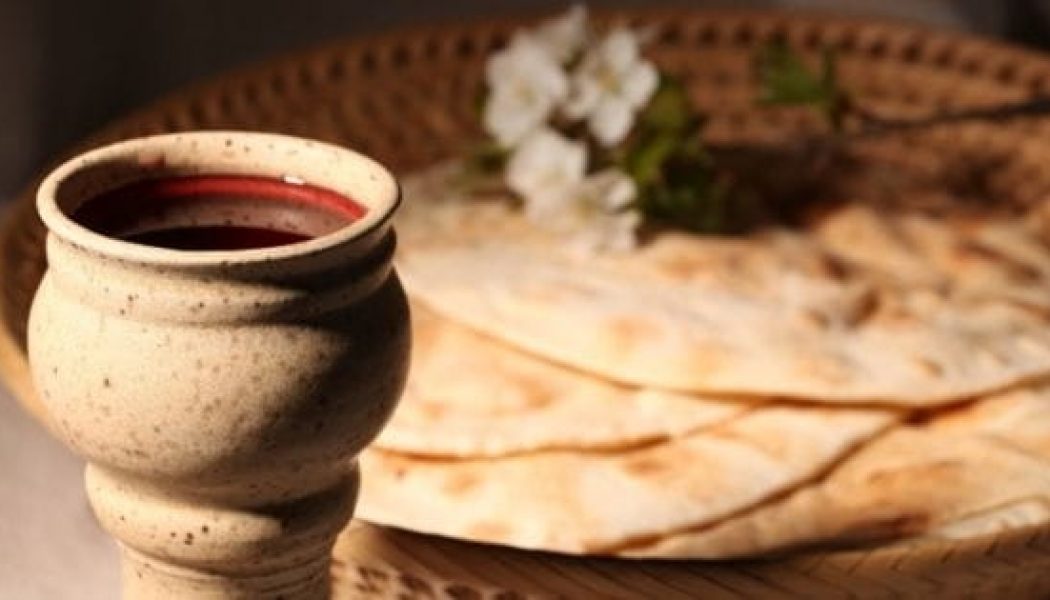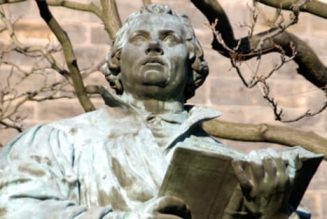
Jesus’ Last Supper provides the basis for one of the most important observances of the Christian church: the Lord’s Supper, also known as Eucharist or Communion in different traditions. From the earliest days of the church, Christians have re-enacted the Lord’s Supper in accordance with Jesus’ instruction that his followers “do this in remembrance of me” (Luke 22:19).
The New Covenant
The significance of the Last Supper is seen in the fact that it is when Jesus instituted the new covenant with God’s people, as he explained, “This cup that is poured out for you is the new covenant in my blood” (Luke 22:20). The Mosaic covenant, which God had made with Israel, was constantly broken because of the sin of God’s people. In the Old Testament, God’s prophets declared that someday God would institute a new covenant with his people and put his law into their hearts: “For I will forgive their iniquity, and I will remember their sin no more” (Jer. 31:31–34).
As he broke bread and passed around the Passover cup, Jesus was being very intentional. The broken bread foreshadowed his body being broken in death, and the cup foreshadowed the shedding of his blood and the absorbing of God’s wrath against sin.
Christ’s death is the basis for the redemption of all God’s people through the new covenant relationship with God that had been promised. The old Mosaic covenant was replaced with the new covenant through the work of Jesus in his life, death, and resurrection, which provided complete atonement for all the sins of God’s people: past, present, and future (Rom. 3:25–26; 2 Cor. 3:1–4:6; Heb. 8:6–13).
Past, Present, and Future
There are many differences in the way various Christian traditions understand and celebrate the Lord’s Supper, but at the core is a basic unity in celebrating God’s redemption in the past, the present, and the future. We see all three of these elements in the Apostle Paul’s explanation of the Lord’s Supper in 1 Corinthians 11:25–26.
As Jesus instructed, we take the Lord’s Supper “in remembrance” (Luke 22:19) of Jesus’ finished work of salvation through his life, death, and resurrection. The bread broken and the wine poured out serve as concrete, tangible reminders of Jesus’ real, physical life and sacrificial death, which occurred once-for-all in the past. As Hebrews says, “We have been sanctified through the offering of the body of Jesus Christ once for all” (Heb. 10:10). The work of salvation is finished (John 19:30).
A Future Hope
Yet when Christians celebrate the Lord’s Supper, it’s not only a way of remembering something past, but also proclaiming something that is present and looking forward to something that is future.
The Apostle Paul tells the Christians in Corinth that “as often as you eat this bread and drink the cup, you proclaim the Lord’s death until he comes” (1 Cor. 11:25–26, emphasis added). When Christians come together for the Lord’s Supper, we are celebrating and joyfully proclaiming the new covenant and the redemption through Jesus’ blood that is offered to all people. It proclaims the present power of the death of Christ and celebrates that we “who once were far off have been brought near by the blood of Christ” (Eph. 2:13). And as we eat and drink the elements Jesus said represent his body and blood, we acknowledge our constant dependence on Jesus as the “bread of life” who came down from heaven (John 6:35–59).
Finally, the Lord’s Supper looks forward to the future, because Jesus is coming again—“you proclaim the Lord’s death until he comes.” As he gave his disciples the cup, he pointed them to his future return: “I tell you I will not drink again of this fruit of the vine until that day when I drink it new with you in my Father’s kingdom” (Matt. 26:29). The book of Revelation portrays a great feast for “the marriage supper of the Lamb” (Rev. 19:6–10), which was anticipated in the prediction of a messianic banquet in Isaiah 25:6–8, Matthew 22:1–14, and Matthew 25:10. Jesus intentionally points his followers toward this future hope at the Last Supper.
When we celebrate the Lord’s Supper, we remember God’s work of redemption in the past, we proclaim his grace in the present, and we look forward to Jesus’ return in the future. It’s a joyful, thankful, hopeful celebration as we reflect on God’s grace to us through Jesus.
In the same way also he took the cup, after supper, saying, “This cup is the new covenant in my blood. Do this, as often as you drink it, in remembrance of me.” For as often as you eat this bread and drink the cup, you proclaim the Lord’s death until he comes.
Justin Holcomb is an Episcopal priest and teaches theology at Gordon-Conwell Theological Seminary and Reformed Theological Seminary. Justin wrote On the Grace of God, Know the Heretics, and Know the Creeds and Councils. He co-authored with his wife Lindsey Rid of My Disgrace and Is It My Fault?. You can find him on Facebook, Twitter, and at JustinHolcomb.com.










